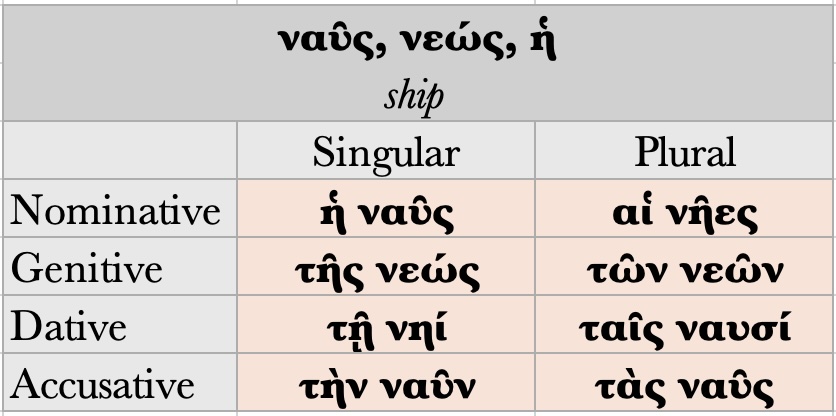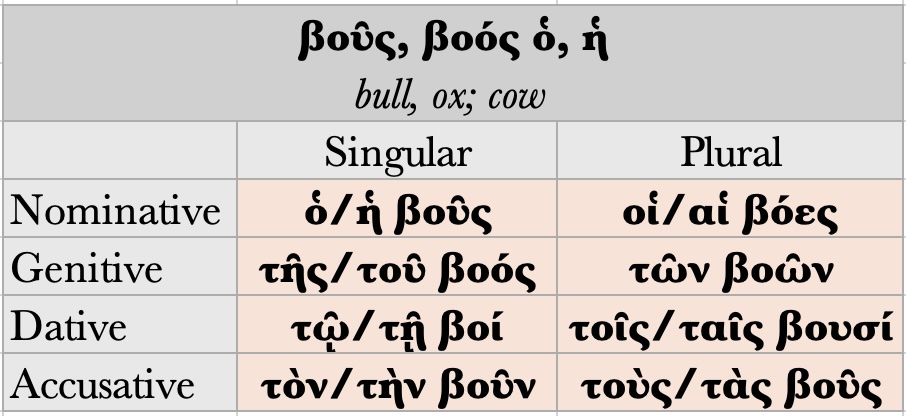The noun ναῦς, νεώς, ἡ ship is a common word in Greek, as might be expected for a people closely associated with seafaring. The stem for this noun ends in –αυ. Like noun stems ending in –ευ, –αυ nouns exhibit more irregularities than stems that end in just –υ. The inflection pattern of ναῦς, νεώς, ἡ must be memorized, though some observations may help (S 275, G 136).
- The vowel stem –αυ drops the –υ before another vowel, resulting in a vowel stem of either –ε or –η.
- The genitive singular ending lengthens from –ος to –ως, due to transference of quantity.
- The accent pattern follows that of a monosyllabic nouns of the 3rd Declension.
- The accusative singular uses –ν instead of –α.
- The nominative singular and accusative plural are identical in form.
The noun βοῦς, βοός, ὁ, ἡ bull or cow, is also a common word in Greek. These animals were important not only for farming and animal husbandry, but for sacrifices.
The stem for this noun ends in –ου (S 275, G 136). Like noun stems ending in –ευ and –αυ, –ου nouns exhibit irregularities. The inflection pattern of βοῦς, βοός, ὁ, ἡ must be memorized, though some observations may help (S 275-278).
- The vowel stem –ου drops the –υ before another vowel, resulting in a vowel stem of –ο.
- The genitive singular remains –ος. No transference of quantity can occur, since the stem vowel –ο is short.
- The accent pattern follows that of a monosyllabic nouns of the 3rd Declension.
- The genitive singular and nominative plural endings do not contract.
- The accusative singular uses –ν instead of –α.
- The nominative singular and accusative plural are identical in form.
- Kings, Ships, Cows, and the Digamma
-
In earlier periods, there were three additional letters in the Greek alphabet: KOPPA (ϙ), SAMPI (ϡ), and DIGAMMA (ϝ). The koppa is a K sound, and remained in use to represent the number 90 in Classical Greek. The sampi is a double-S sound, and remained in use to represent the number 900.
The digamma represents the W sound. Though the sound, and so the letter, eventually dropped from most dialects by the Classical period, its presence and subsequent loss affected a number of Greek words, particularly nouns with stems ending in –ευ, –αυ, and –ου (S 122, 278). For example, forms such as βασιλέως, βασιλεῖ, and βασιλέα ultimately derive from βασιλήϝος, βασιλήϝι, and βασιλήϝα. Gradually, the loss of the digamma, together with transference of quantity, resulted in the forms that we encounter today.
Similarly, forms such as νεώς and βοός derive ultimately from νηϝός and βοϝός. Compare these early forms with the Latin nouns navis and bovis, which preserved the W sound with the Latin letter V. Also of note: Latin preserved the letter koppa in its adaptation of the Greek alphabet, and is the source for the English letter Q.




